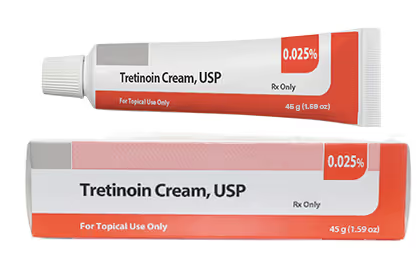Introduction
Many people with persistent acne face a tough decision in the summer: start the highly effective medication Accutane (isotretinoin) now and risk the sun, or wait until the fall and endure another season of breakouts and potential scarring? It's a common dilemma, as Accutane is famous for both its powerful results and its potential to increase sun sensitivity.
The good news is that you don't necessarily have to put your journey to clear skin on hold. While taking Accutane during sunny seasons requires careful planning, it is often a safe and strategic choice.
In this blog post, we'll explore everything you need to know to make an informed decision, from the essential safety precautions to how Accutane's sun sensitivity compares to other common treatments.
Accutane and Increased Sun Sensitivity
Accutane reduces the thickness of the stratum corneum, which is the outermost layer of the skin (“dead skin cells”). This reduces its ability to block ultraviolet light, which can increase the risk of sunburn. In addition, since isotretinoin reduces oiliness of the skin, this can further increase sun sensitivity while taking this medication (AAD).
Essential Sun Safety Precautions on Accutane
Due to the increased sensitivity caused by Accutane, it is crucial to adopt rigorous sun safety measures.
Here are key strategies to protect your skin:
1. Utilizing Sun-Protective Clothing
One effective method to safeguard against sun exposure is wearing sun-protective clothing. Opt for lightweight, long-sleeved shirts, pants, and a wide-brimmed hat when outdoors. This physical barrier is your first line of defense in protecting against harmful UV rays (Mayo Clinic).
2. Choosing the Right Sunscreen
- Select a broad-spectrum sunscreen that protects against both UVA and UVB rays.
- Based on recent trials the sunscreen has an SPF of 50 or greater for adequate protection.
- Use a water-resistant formula and reapply frequently, especially after swimming or sweating.
The choice of an acne-safe sunblock is particularly important as some formulations might exacerbate acne. Frequent reapplication ensures continuous protection throughout sun exposure (source).
3. Avoiding Prolonged Sun Exposure
While on Accutane, it's advisable to limit your time in the sun as much as possible. Seek shade whenever you're outdoors for extended periods to minimize exposure. Activities such as beach vacations or outdoor sports may necessitate adjustments to the Accutane dosage to mitigate increased risks of sunburn and skin damage. However, If you do a good job with your sun protection (e.g. sunscreen), you should be in good shape.
Is it Worth Taking Accutane During the Summer?
With the warnings about sun sensitivity, it’s natural to wonder if starting Accutane during the spring or summer is a good idea. While there are important considerations, for many patients, the answer is yes—the benefits of starting sooner often outweigh the risks.
A primary reason to move forward with treatment is to prevent further skin damage. Accutane is frequently prescribed for cystic or scarring acne, and delaying treatment by a season or two could result in additional permanent scarring. Furthermore, starting your Accutane course in the summer means you could enjoy clear skin by the fall, just in time for a new school year or the holiday season.
It’s also important to consider the alternatives. Common oral acne medications that people turn to, like the antibiotic doxycycline, can make you even more sun-sensitive than Accutane. At Honeydew, we see more patients experiencing sun-related issues like rashes and severe burns while on doxycycline than on Accutane.
Ultimately, taking Accutane safely in the summer comes down to being diligent with the sun protection strategies mentioned earlier. For those who are still concerned, starting on a lower "microdose" can be an excellent middle ground, allowing you to begin your journey to clear skin while minimizing side effects.
Is it Worth Starting Accutane in the Summer?
Here, the answer is yes as well. As long as you take necessary precautions, starting Accutane during the summer is perfectly reasonable. However, if you want to avoid the issues with sun exposure, there are still reasons why starting during the summer may be a good idea for patients who can become pregnant.
For patients who can become pregnant, you must enroll in iPledge. When starting your treatment, iPledge requires that you wait thirty days before you can take your first dose of Accutane. So starting treatment in say July or August means that you'll start taking Accutane by the time summer is almost over, which will let you get a head start on compliance while avoiding issues related to sun exposure.
Honeydew: Your Partner in Safe Accutane Treatment
When considering or undergoing Accutane treatment, partnering with a reliable healthcare provider like Honeydew can be invaluable. Honeydew offers a streamlined approach to managing acne treatment, providing low-cost, on-demand services tailored to individual needs.
Why Choose Honeydew for Your Accutane Journey?
- Comprehensive care plans that address your skin concerns holistically.
- Personalized treatment adjustments to ensure safety and effectiveness.
- Access to experienced dermatologists who provide ongoing support throughout your treatment.
- Convenient access to quality skincare products and medication.
Honeydew's membership model allows patients to benefit from expert insights and dermatological advice without financial strain. To ensure a successful Accutane experience while minimizing risks, consider signing up for a membership at Honeydew.
Conclusion
Accutane remains an effective treatment for persistent acne. However, its interaction with sun exposure requires careful management. By embracing sun protection strategies and partnering with providers like Honeydew, individuals can optimize their treatment outcomes while safeguarding their skin health.























